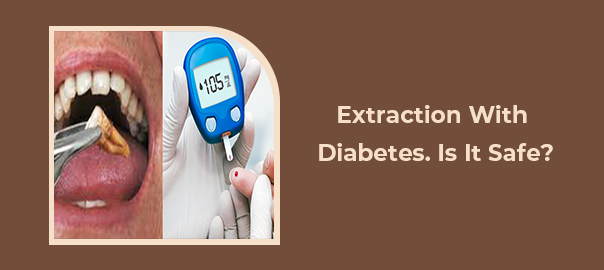
Managing Dental Care: A Guide to Tooth Extraction for Individuals with Diabetes
Table of Contents
Dental care is essential for everyone, but it becomes even more crucial for individuals managing diabetes. Among various dental procedures, tooth extraction can pose specific challenges for those with diabetes due to increased risks of complications. In this guide, we’ll delve into the risks of infection, the impact of diabetes, and effective management strategies for tooth extraction in individuals with diabetes.
Risks of Infection
Individuals with diabetes are more susceptible to infections due to compromised immune function and impaired wound healing. When undergoing tooth extraction, the risk of infection is increased because the procedure creates an open wound in the mouth.
Bacteria in the oral cavity can easily enter the bloodstream through the extraction site, leading to gum disease (periodontitis) or even more severe conditions like osteomyelitis (bone infection). Therefore, meticulous oral hygiene and post-operative care are crucial to prevent infections in diabetic individuals undergoing tooth extraction.
Impact of Hyperglycemia
Hyperglycemia, or high blood sugar levels, can significantly affect the outcome of tooth extraction in individuals with diabetes. Elevated blood glucose levels impair the body’s ability to fight infection and hinder the healing process. Moreover, hyperglycemia can exacerbate inflammation and increase the risk of complications such as dry socket, a painful condition where the blood clot dislodges from the extraction site prematurely. Poorly controlled diabetes can also lead to delayed wound healing and increase the likelihood of post-operative complications.
Management Strategies
Proper diabetes management before, during, and after tooth extraction minimizes complications and promotes optimal healing. Here are some essential strategies:
Pre-operative Assessment
- 1. Ensure blood sugar levels are well-controlled before scheduling the procedure.
- 2. Consult with your dentist and primary care physician to coordinate care and adjust medications if necessary.
- 3. Provide a your dental team with detailed medical history, including any medications and previous dental experiences.
Intra-operative Care
- 1. Inform your dentist about your diabetes status and any concerns you may have.
- 2. Monitor blood sugar levels closely before and during the procedure.
- 3. Use appropriate anesthesia techniques to minimize stress and discomfort.
- 4. Maintain strict aseptic methods to reduce the risk of infection.
Post-operative Management
- 1. Follow post-operative instructions provided by your dentist meticulously.
- 2. Monitor blood sugar levels regularly and adjust medications as your healthcare provider instructs.
- 3. To keep the extraction site clean, practice good oral hygiene, including gentle brushing and rinsing with salt water.
- 4. Avoid smoking, which can impair healing and increase the risk of complications.
- 5. Stay hydrated and consume soft, nutritious foods to aid in the healing process.
Conclusion
Tooth extraction can be a daunting prospect for individuals with diabetes, but with careful planning and proper management, the risks can be minimized, and successful Outcomes can be achieved. By understanding the risks of infection, the impact of hyperglycemia and implementing effective management strategies, individuals with diabetes can confidently navigate dental care and maintain optimal oral health. Remember to communicate openly with your dental team and healthcare providers to ensure personalized care tailored to your needs.
DISCLAIMER:Please note that the prices mentioned on this page: (a) present a range (depending upon the severity of the dental condition, the technology used in treatment, type of dental products used, etc.); (b) are true as on the date of this page and may change on a later date, in accordance with the standard company policy; (c) may be subject to standard aberrations or generalizations on account of the use of AI in general Google/internet search by you.Leave a Reply
Leave a Reply
Explore More Similar Posts
Explore More Blogs


Leave a Reply